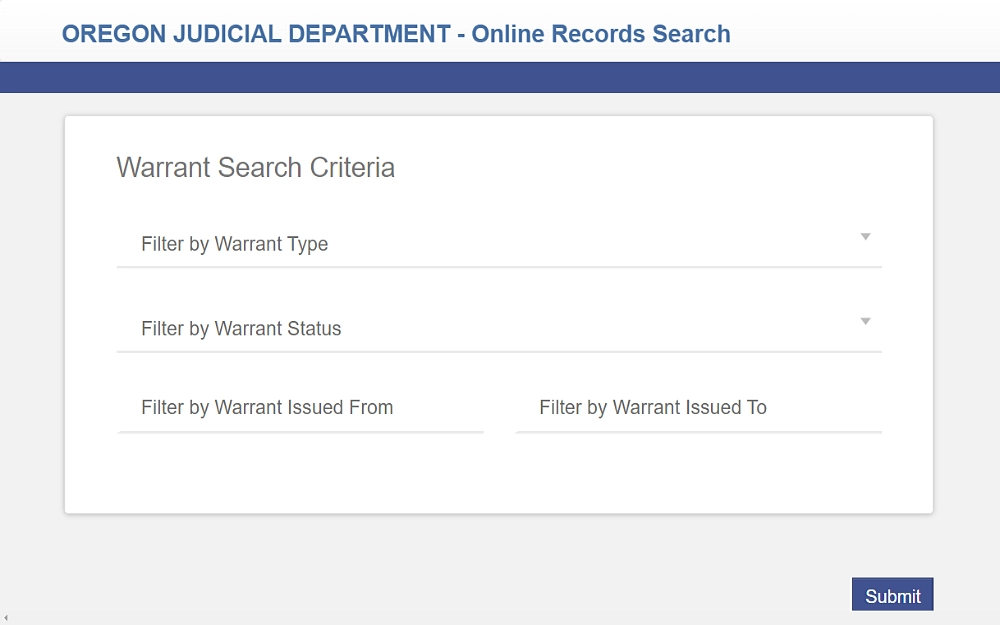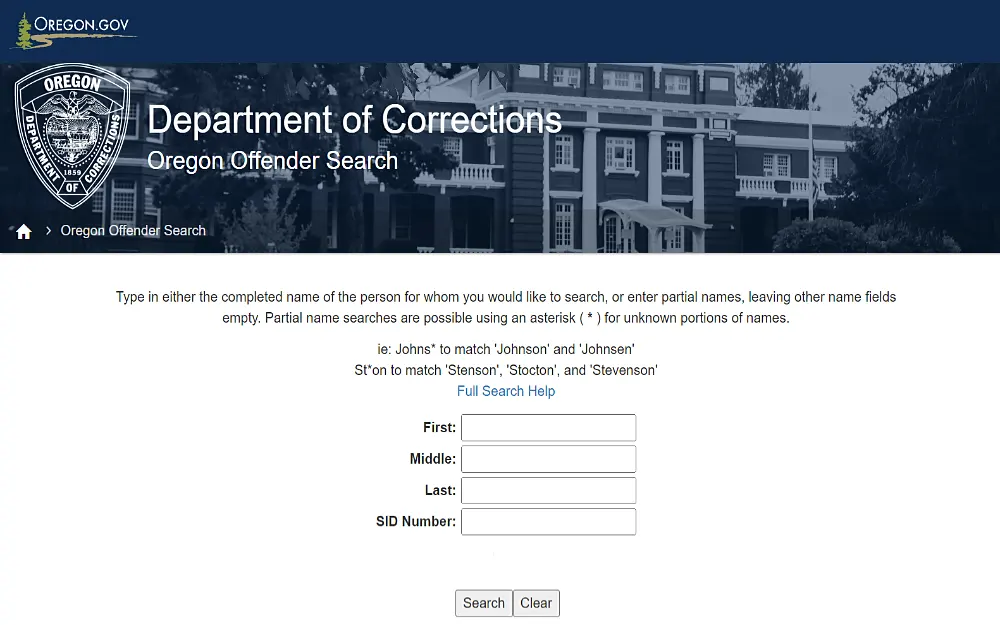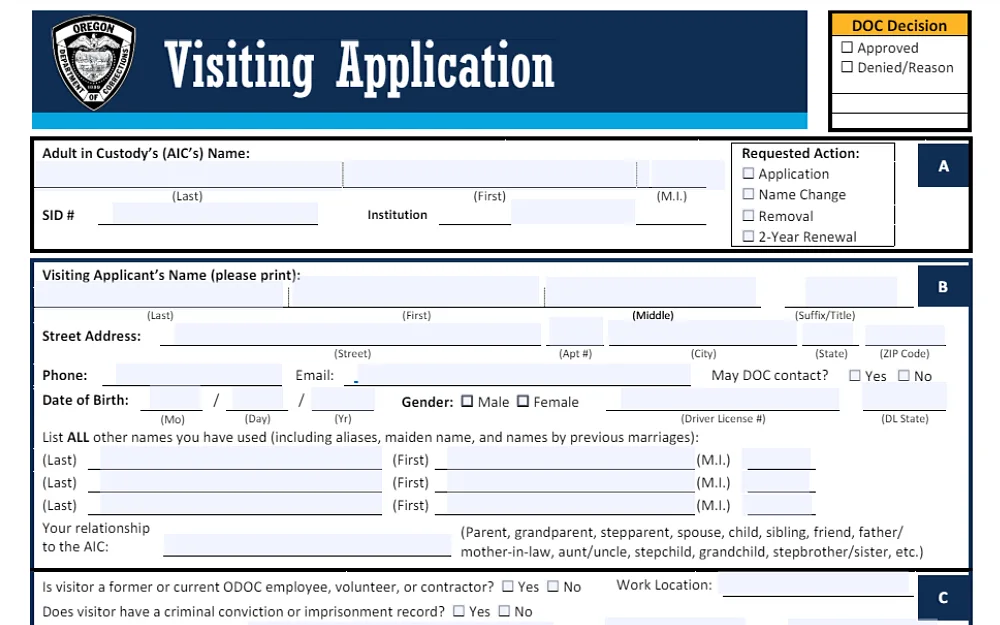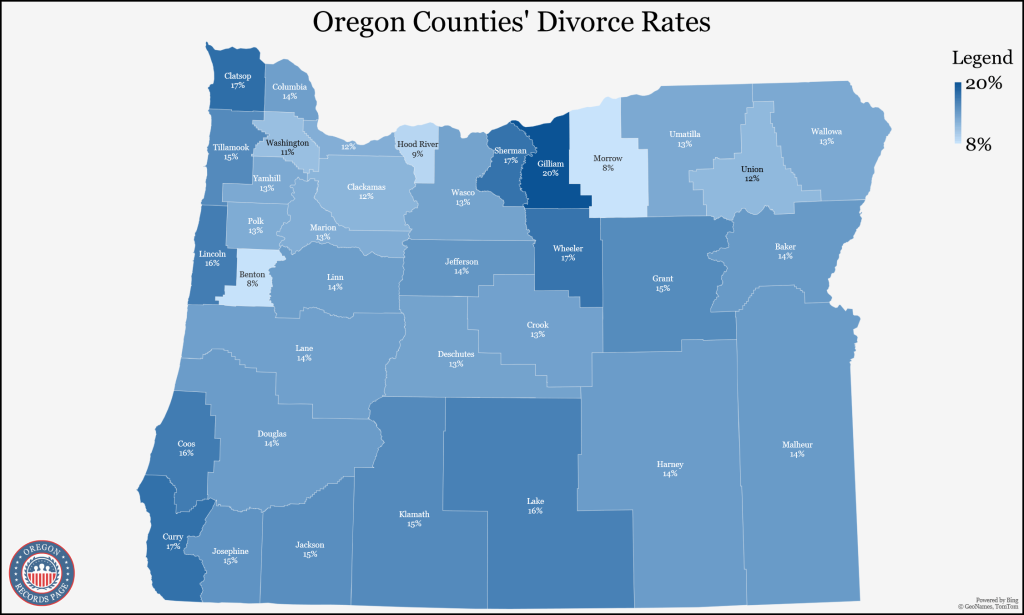Review Oregon state records for free today using the steps and search tools provided for you within this streamlined resource.
The state of Oregon has made these records accessible to the public, but there are certain exceptions and searchers must know who hosts each record type for a more seamless and expedited lookup; rest assured that this article offers official online databases and record access for searching anyone’s public information in Oregon at no cost.
Oregon State Records & Public Access Laws
Citizens have the right to access government records thanks to the Freedom of Information Act (FOIA). Oregon has its own FOIA law called the Oregon Public Records Law.
It allows Oregon residents to request public records with or without a specific objective. Nevertheless, records that are associated with computer programs and health treatments less than 75 years old are exempt from this law.1
Records can be obtained through third-party sites or through government sources, but searchers need to know where to locate the correct documents and government before they begin their research.
Criminal Records of Oregon: An Overview
Oregon criminal records, sometimes called rap sheets, typically contain any conviction records, arrest charges, and identifying information like a social security number. Prospective landlords and employers have to know a person’s criminal history to see if they pose a threat to their business or other people.
Does the Public Have Access to Oregon Criminal Records?
The answer to this question is “yes and no.” To put it in another way, ORS 181A.220 keeps some criminal records confidential and other criminal records open to the general public, particularly if said records are made non-disclosed due to a court order.
Where Can I Find Oregon Criminal Records?
Though public access to criminal records is limited, the Oregon State Police – Criminal Justice Information Services (CJIS) provides an Open Data Portal. Searches are limited to in-state arrests less than a year old. The only older arrests that show up are ones where the subject was found guilty. Each search costs $33.00.
If someone wants to retrieve their own criminal history records, they first have to get fingerprinted. The fingerprinting fee is $20.00. They can obtain fingerprints from a service that offers it, their local police department or sheriff’s office, or at the Oregon State Police Salem location.
The fee for a self-criminal history check is also $33.00. The Salem headquarters and fingerprinting submit addresses are below:
Oregon State Police Salem HQ
3565 Trelstad Ave Southeast, Bldg #1,
Salem Oregon
Fingerprinting Submission Address:
OSP – Criminal Justice Information Services
P.O. 4395
Portland OR 97208
Oregon residents can print out and fill out paper forms if they’re unable to order records online.
If someone has questions regarding criminal records, they can dial (503)-378-3720 or send a message to [email protected].
Additionally, the Oregon Judicial Branch offers an Online Records Search that give access to court databases containing criminal cases. Records can be access for free, however there are some that require a fee to obtain records.
Another option is through the county court and local government agencies, including the sheriff’s offices and police departments. Most of these departments offer an online tool to access criminal records.
Lastly, interested parties who want to conduct nationwide checks can obtain national criminal history checks through the Federal Bureau Investigation (FBI).
Who Can Look Up Juvenile Records in the State of Oregon?
In the state of Oregon, the accessibility of juvenile records varies depending on specific circumstances. Some records are considered public, while others are confidential.
To elaborate, there are two kinds of private juvenile records including history and prognosis records and court records.
They can only be accessed by authorized individuals like parents or legal representatives. Records that are alright for the public to view are anything related to court dispositions, detentions, or formal accountability agreements.2
How To Check for Outstanding Warrants in Oregon (Free OR Wanted Person Check)
Oregon state records, particularly warrant information, can be accessed by the public. While there are several types of warrants in the states, it’s important to know how to find these records.
Oregon Judicial Branch offers an Online Case Records Search Tool that allows the public to search for case information, including warrants. To begin the search, user must click on the “Advance Filtering Options”, then look for “Warrant” criteria. This lets site visitors filter results by type, status, and warrant date.

The public can use the warrant search tool provided by local government agencies such as the county sheriff’s office or county court to check for outstanding warrants.
Use the Oregon Sex Offender Registry To Check Nearby Neighborhoods
The Oregon State Police maintains a Sex Offender Registry repository. Note that it only features Level 3 sex offenders, a.k.a. individuals who are extremely dangerous and are likely to prey on someone again.
Once they type in a captcha and agree to the website’s conditions, site visitors can click on the “Search” tab to find an offender by name or address. Additionally, there’s a map search option that pulls up a map of Oregon and a list of offenders. Each offender listed has a photo and identifying information. There is also a button that lets users download a list of offenders.
The National Sex Offender Public Website (NSOPW) is useful for those who want to conduct a national search. They can search by name or location that includes areas like Indian Country, DC, and US territories.
All About Oregon Background Checks
Background checks are usually required for occupations that involve providing medical care to humans and pets or working with sensitive information. Nonetheless, other kinds of background checks aren’t related to certain jobs.
People need to go through background checks to obtain weapons, apply for a loan, or adopt a child. Details that typically show up on these checks include credit history, past and current addresses, and any crimes committed.
There are many rules people have to abide by in regards to background checks to ensure the safety of their clients. In addition, they have to submit their checks through Oregon Criminal History & Abuse Database System (ORCHARDS), a service offered by the state’s Background Check Unit (BCU).
The Open Record criminal history portal mentioned earlier is something employers can use to run background checks on potential employees. It comes with a business account option they can sign up for through the portal.
Firearms dealers have to use the Firearms Instant Check System (FICS) to conduct a background check before they can take part in gun shows. Each transaction costs $10.00, and they can get their checks processed through the FICS Online Portal.
Court Records of Oregon
Court records in Oregon typically consist of documentation of trial hearings, the name of the plaintiff or defendant, and any information about the attorneys involved in said case. The general public is allowed to access most court records.
With that said, some of these Oregon state records have to be kept confidential like mental health and adoption cases.
Three sections of courts that encompass the Oregon Judicial Branch including circuit courts, appellate courts, and the tax court:
- Circuit courts — also called trial courts, deal with civil, criminal, small claims matters, and other general jurisdiction cases. Furthermore, they support case resolution programs like parental education programs and treatment courts.
- Appellate courts — include the Oregon Court of Appeals and the Supreme Court. The Oregon Court of Appeals handles retrials transferred from circuit courts. The Oregon Supreme Court is the “last resort” court that oversees the other courts. Both are located in Salem, Oregon.
- Tax court — is split into the Magistrate Division and the Regular Division. Any court case that can’t be resolved in the Magistrate Division is sent to the Regular Division to be appealed. This court works with tax appeals cases associated with property tax, income tax, and other kinds of taxes.
Where Can I Find Court Records in Oregon?
There are many ways Oregon residents can retrieve public court records. They can use the aforementioned Online Records Search portal.
The Oregon Judicial Branch offers another online records search feature called the Oregon Judicial Case Information Network (OJCIN) Online.7 Unlike the Online Records Search portal, it lets members research cases from all courts, which is why it charges a subscription fee.
If someone needs to go to a specific circuit court for information, they need to visit the Oregon Judicial Branch’s Self-Help Center and scroll down to “Find a Court.” Then, they select a court from the list by clicking on the “Select Your Court” button. Additionally, someone can visit any of them to research through their public access terminals.
Those who don’t mind sending written requests for Court of Appeals and Supreme Court records can send a letter or an email to the Appellate Court Records Section. Its contact information is:
Records Admin – Appellate Court Records Section
Supreme Court Bldg, 1163 State St
Salem OR 97301
Email: [email protected]
To obtain Tax Court records, people can send their request to the above address or email at [email protected]
Oregon residents aiming to obtain administrative records can send their request online or to the below address:
Office of the State Court
Supreme Court Bldg.
1163 State St.
Salem OR 97301
Find Out if Someone Filed Bankruptcy in Oregon
A person can access someone’s bankruptcy records through the US Bankruptcy Court of the District of Oregon. It has locations in Portland and Eugene, and both of them offer computer terminals for patrons to view records. The price for printed copies is $0.10, and it’s $0.50 for photocopies.
The Public Access to Court Electronic Records (PACER) is an excellent option for those who rather conduct their search from home than from a courthouse. They can search nationwide or focus on finding records from a specific court. Document pages are $0.10 each.
Another option someone can use from home is the Voice Case Information System. They need to dial (866)-222-8029 Ext. 633 to retrieve bankruptcy record information. The service is available 24/7.
Archiving bankruptcy records from the National Archives at Kansas City requires a road trip, but it should be worth it for people interested in obtaining ancient files. Below is its address:
NARA at Kansas City
400 West Pershing Rd.
Kansas City MO 64108
Oregon Inmate Records
As of now, there are 7,100 inmates in Oregon jails. Approximately 15,000 inmates reside in the state’s prison system.3
Inmate records typically contain mugshots, offense details, and Oregon’s correctional institution names. Knowing this information helps others determine how dangerous they are and if they’re eligible for probation or parole.
Find Out if Someone Is in Jail or Arrested
Locals who are interested in someone’s inmate or custody status can use a search engine to locate them. Searchers should type the words “Oregon arrest and inmate search” to receive lists of inmates and arrestees from various county jails. Or, they can type their “county name + inmate search” to see if their local sheriff’s office hosts arrest records online.
Otherwise, calling local sheriff’s offices or police departments may be a viable option.
People who were targets of crime may find comfort in the Victim Information & Notification Everyday (VINE) website. They can track the whereabouts of current inmates dwelling in local jails and prisons. Users can access victim resources when needed as well.
How To View Oregon Mugshots Online
As the old saying goes, “A picture’s worth a thousand words,” and that holds true when tracking an offender. But, Oregon is very unique in its handling of mugshots.
In June 2021, Oregon Legislature passed House Bill 3273, which dictates that the display of booking mugshots should be limited until the suspect is convicted. The goal of this law is to protect individuals from harassment, particularly if they’re proven innocent in court.4
With that said, people can hunt down inmate photos by entering the words “Oregon jail mugshots” or “Oregon police department mugshots” into Google or Bing. This brings up many results related to jail rosters, daily reports, and current inmates.
For example, the Oregon County Sheriff’s Office has a Most Wanted Page with mugshots. Some are even labeled with the word “Arrested” on them.
Locals can also check their favorite newspapers or TV news stations for mugshots.
Finding & Obtaining Prison Inmate Records in Oregon
There are 14 prisons operated by the Oregon Department of Corrections (DOC). It provides a State Offender Search Tool, which makes it easier for someone to locate a person incarcerated in one of these prisons.8 They can consult the Help section for assistance.

Individuals can opt to submit a public records request to obtain records from any Oregon DOC facility. They have to give thorough details like subject matter and inmate ID numbers to receive the records they’re looking for. Requesters are required to submit an information request and/or a pen pack request form. People can also call a facility to check up on an inmate.
The Federal Bureau of Prisons (BOP)is the place to search for federal inmates. Site visitors can either use its inmate locator or research specific states through its list of prisons.
Prisoner Correspondence
People can communicate with an inmate in three ways: by phone, letter, and/or electronic means:
- Phone Communication: Phone calls between inmates and their loved ones have to be set up through ICS Corrections, Inc. Before speaking with an inmate, people have to validate their phone number through ICSolutions or wait for an inmate to call them first. They can also leave voice messages for $0.50 by dialing (877)-831-0390. Calls have a half-hour limit, and they’re monitored.
- Letters: Friends and relatives can only send letters and photographs to inmates. (If they want to send a book to their loved one, it has to be through an approved distributor.) Every mail piece is thoroughly inspected before being given to an inmate.
- Text & Video Calls: CorrLinks allows prisoners to communicate with others through their facility tablet. It also lets loved ones use their CorrLinks account to send and receive messages. A video call service provided by ICS Corrections and ICSolutions makes it possible for people to use their mobile devices or computers to make video calls to prisoners.
Sending Money to an Oregon Inmate
Because some prison communication services cost money, Oregon residents can help their incarcerated loved ones pay for them by depositing money by mail or online. They’re required to send an email to Central Trust before depositing payments into an inmate’s account via their email address, Dldoctrustinfo.doc.state.or.us.
Telmate, JPay, and ICS Corrections are the electronic methods of sending money. People can use their debit or credit cards to send money through one of these websites or with the help of a customer service agent by phone.
Mail payments (checks or money orders) can be sent to this address:
Central Trust, Inmate Name, SID Number – Oregon DOC
P.O. Box 14400
Salem OR 97309
Visiting an Oregon Inmate
Prospective visitors have to fill out and submit a visitor application.9

Once approved, they’re added to an inmate’s visiting list.
They also have to follow certain visitation guidelines before their visit.
Oregon Vital Records Office
Oregon vital records include domestic partnership registration, pre-adoption certificates, fetal death certificates, divorce certificates, birth certificates, marriage certificates, and death certificates. This portion of the article focuses on certificates someone may find at the Oregon Vital Records Office:
- Birth Certificates
- Death Certificates
- Marriage Certificates
- Divorce Certificates
Which Vital Records Are Publicly Accessible in Oregon?
Birth, death, marriage, and divorce are Oregon state records that are open to the public after a certain length of time has passed. Birth records have to be at least 100 years old for the general public to access. Death, marriage, and divorce records have to be 50 years old or older.5
Despite these limitations, third-party sites may be able to provide searchers with more recent vital record information since they don’t have the same restrictions and check multiple sources across the web.
Additionally, marriage and divorce rates are made public by the US Census Bureau and the image below shows the percentage of divorced individuals in every Oregon county.

How To Check if Someone in Oregon Is Married (Divorce & Marriage Records)
Those who are curious about the marriage or divorce status of someone have to be related to the person in question or have special permission before buying a certificate. They can be a spouse, blood relative, or a court representative.
Patrons can place orders through the following six methods.
- Regular Mail: This option accepts check and money order payments. Processing time is approximately five to eight weeks. Address is:
Oregon Vital Records
P.O. Box 14050
Portland OR 97293
- Rush Mail: Customers can have their order shipped within 3 – 5 business days.
- In-person: People have to make an appointment before arriving with this method. They enter orders via self-serve stations.
- Drop Box: There’s a box outside the building where patrons can submit proper documentation. Processing time is about 5 – 7 days.
- Phone: Someone can order by calling (888)-896-4988 any time of the day. This option only accepts debit and credit cards, and the shipping time is about three days.
- Online: A site visitor pays with a credit or debit card after ordering through VitalChek. Shipping time for this method is also three days.
Though the Oregon Vital Records Office offers divorce certificates, it doesn’t provide divorce decrees. Individuals need to find Oregon divorce documents at the court clerk in the county where the divorce took place.
Fees run between $28.00 and $44.95 depending on the ordering method someone uses. Extra copies cost $25.00. Below are the required applications customers need to submit with their orders:
- English Marriage Certificate Application
- Spanish Marriage Certificate Application
- English Divorce Certificate Application
- Spanish Divorce Certificate Application
Lost an Oregon Birth or Death Certificate? How To Order a Replacement
If someone is desperate to replace a birth or death certificate they recently lost, they can follow the steps outlined in the previous section about ordering marriage and divorce certificates. Here are the applications required for birth and death certificate orders:
- English Birth Certificate Application
- Spanish Birth Certificate Application
- English Death Certificate Application
- Spanish Death Certification Application
Searching for public information, whether it’s concerning someone else or themselves, doesn’t have to be a burden. After studying this resource, readers may realize that finding Oregon state records can be simple and educational.
References
1Oregon FOIA Laws – National Freedom of Information Coalition. (n.d.). National Freedom of Information Coalition. Retrieved June 27, 2022, from <https://www.nfoic.org/oregon-foia-laws/>
2Juvenile Records. (n.d.). Deschutes County. Retrieved June 27, 2022, from <https://www.deschutes.org/justice/page/juvenile-records>
3Oregon 2019. (n.d.). National Institute of Corrections. Retrieved June 27, 2022, from <https://nicic.gov/state-statistics/2019/oregon-2019>
4Parfitt, J. (n.d.). Oregon says goodbye to most mugshots starting Saturday. kdrv.com. Retrieved June 27, 2022, from <https://www.kdrv.com/news/local/oregon-says-goodbye-to-most-mugshots-starting-saturday/article_57a79c2d-c36f-5feb-a42c-1b910898a463.html>
5Birth, marriage, divorce, death—How to find vital records in Oregon. (2018, January 10). Multnomah County Library |. Retrieved June 27, 2022, from <https://multcolib.org/blog/20180110/birth-marriage-divorce-death%E2%80%94how-find-vital-records-oregon>
6Oregon Judicial Department. (2017). Online Records Search. Smart Search. Retrieved June 1, 2023, from <https://webportal.courts.oregon.gov/portal/Home/Dashboard/29>
7Oregon Judicial Department. (2023). OJCIN OnLine Sign Up. Opening an OJCIN Online Subscription Account. Retrieved June 1, 2023, from <https://www.courts.oregon.gov/services/online/Pages/ojcin-signup.aspx>
8Oregon Department of Corrections. (2023). Oregon Offender Search. Retrieved June 1, 2023, from <http://docpub.state.or.us/OOS/intro.jsf;jsessionid=7578B7296C20C8C78FB15F42A052B6F6.wrkr-DP1-Blue>
9Oregon Department of Corrections. (2022, January). Visiting Application. Retrieved April 29, 2024, from <https://www.oregon.gov/doc/Forms/cd-50-visiting-application-updated.pdf>
